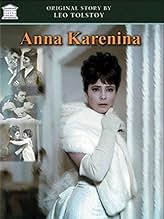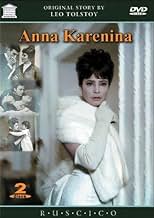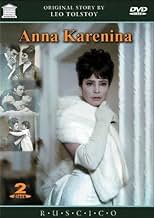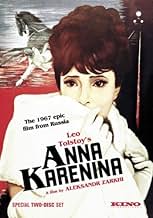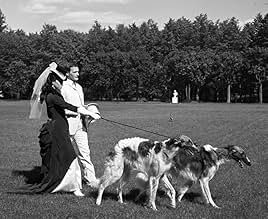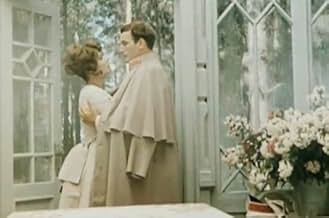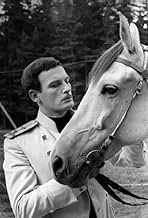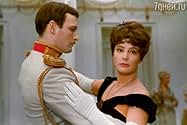AVALIAÇÃO DA IMDb
7,0/10
1,1 mil
SUA AVALIAÇÃO
Adicionar um enredo no seu idiomaAnna Karenina is a young wife of an older husband. She has an affair with the handsome Count Vronsky. By following her desires Anna complicates her life.Anna Karenina is a young wife of an older husband. She has an affair with the handsome Count Vronsky. By following her desires Anna complicates her life.Anna Karenina is a young wife of an older husband. She has an affair with the handsome Count Vronsky. By following her desires Anna complicates her life.
- Direção
- Roteiristas
- Artistas
Yuriy Yakovlev
- Stiva Oblonsky
- (as Yu. Yakovlev)
Boris Goldayev
- Konstantin Levin
- (as B. Goldayev)
Anastasiya Vertinskaya
- Kitty
- (as A. Vertinskaya)
Iya Savvina
- Dolly
- (as I. Savvina)
Maya Plisetskaya
- Knyagina Betsy
- (as M. Plisetskaya)
Lidiya Sukharevskaya
- Lidiya Ivanovna
- (as L. Sukharevskaya)
Elena Tyapkina
- Knyagina Myagkaya
- (as Ye. Tyapkina)
Sofiya Pilyavskaya
- Grafina Vronskaya
- (as S. Pilyavskaya)
Andrey Tutyshkin
- Lawyer
- (as A. Tutishkin)
Vasili Sakhnovsky
- Seryozha
- (as Vasya Sakhnovsky)
Anatoliy Kubatskiy
- Camerdiner Kapitonich
- (as A. Kubatsky)
- Direção
- Roteiristas
- Elenco e equipe completos
- Produção, bilheteria e muito mais no IMDbPro
Avaliações em destaque
Anna Karenina by Leon Tolstoy is the best novel I have ever read. I have seen a few movies based on it, but the best one on my opinion is that old version with Samoilova, Lanovoy, Vertinskaya and of course the amazing Maya Plissetskaya. What a wonderful cast! For me, Samoilova is the closest physically to Anna's character and for that, I can forgive the gossips about the influence of her father in obtaining this role. The movie is great and until now, 2005, nobody can beat it. Even taking into account the dark ages when this movie was done, it it regretful that it is not known enough throughout the world. I just keep hoping that it will be screened again at least on TV.
I must agree with 'iliawarlock' on Samoylova's performance - but even though this is undoubtedly the weakest link, the film doesn't hold on many stronger points. Samoylova, who is best suited to play Soviet peasant or worker, is only the emanation of the overall psychological flatness, ignorance and self-content, characteristic of many destroyer-of-classic-texts communist era films. Plisetskaya is brilliant, and Lanovoy is also delightful. An interesting fact is that, before a screening which took place in Sofia, Bulgaria, the still magnificent Vasiliy Lanovoy commented that his character Vronsky was incapable of the great love which Karenina had the gift for. From his performance, I got quite the opposite impression of a highly sensitive and devoted Vronsky - but thats the greatness of a complex text. Too bad we cannot witness a complex (if any) psychological interaction with Karenina in this dramatization.
This movie was done well. The filming was beautiful and Tolstoy's novel (in so far as it is possible) was presented in a good light. The only spot that marred an otherwise-good film was the performance of the leading actress, Samoilova, playing Anna Karenina herself. So inept, clumsy,, irritatingly false and unconvincing was her performance that my single greatest sentiment throughout the film was: "Come on! Throw yourself on the train-tracks and get it over with!" Sadly, for over two hours my prayers went unanswered. A positive note, however, was struck by the stunning performance of the former legendary ballerina, Maya Plisetskaya in her role as the social lioness, Princess Betsy Tverskaya. Vasilij Lanovoj (memorable as Shervinsky, in 'Dni Turbinykh) was also a pleasure to watch as he made the most out of the relatively small role of Vronsky. In short: This would be a higher-than-average film, but for the tragically poor performance of the single actress that was under particular obligation to play well.
This film re-creates the historical setting of the 1860s brilliantly, then spoils it all with an Eisensteinian-expressionistic style of acting and photography that gives one the giggles with its melodramatic jerkiness. Worst of all is Rodion Shchedrin's shrill, strident score. It would be too loud and insistent for an axe murder in an insane asylum; in a drawing room from the reign of Alexander II it sounds simply ludicrous and irritating.
Vasili Lanovoy is handsome and romantic-looking as Count Aleksey Vronsky—his stiff bearing probably correct stylistically, his costumes wonderful. He does love to stare and lurch in that "I-am-Ivan-the-Terrible's-kid-brother" manner of Soviet film. His hair piece is not very good, either.
Lanovoy does at least very much look his part, which is more than can be said of the woman playing Anna Karenina. She looks a lot more like Anna Magnani, complete with black moustache. Mme Karenin is supposed to be an extraordinary aristocratic beauty, a being from the highest society. Here she looks like she has strayed from a film by Pietro Germi. The actress likes bombastic reactions right out of Mexican television drama, which the camera captures with Shchedrinesque careenings.
That great acting was possible, even in this school of film, is witnessed to by the master player of the role of Aleksey Karenin, Nikolai Gritsenko (1912–1979). He is quite unforgettable and detailed; he helps one understand Tolstoy better.
Most of the film is the other way around: one would hardly understand anything if one had not previously read the novel. The abrupt and disconcerting editing doesn't help.
No film could ever hope to do justice to such a literary masterpiece, but Clarence Brown's 1935 version is incomparably more satisfactory. Too bad. This could have been wonderful.
Vasili Lanovoy is handsome and romantic-looking as Count Aleksey Vronsky—his stiff bearing probably correct stylistically, his costumes wonderful. He does love to stare and lurch in that "I-am-Ivan-the-Terrible's-kid-brother" manner of Soviet film. His hair piece is not very good, either.
Lanovoy does at least very much look his part, which is more than can be said of the woman playing Anna Karenina. She looks a lot more like Anna Magnani, complete with black moustache. Mme Karenin is supposed to be an extraordinary aristocratic beauty, a being from the highest society. Here she looks like she has strayed from a film by Pietro Germi. The actress likes bombastic reactions right out of Mexican television drama, which the camera captures with Shchedrinesque careenings.
That great acting was possible, even in this school of film, is witnessed to by the master player of the role of Aleksey Karenin, Nikolai Gritsenko (1912–1979). He is quite unforgettable and detailed; he helps one understand Tolstoy better.
Most of the film is the other way around: one would hardly understand anything if one had not previously read the novel. The abrupt and disconcerting editing doesn't help.
No film could ever hope to do justice to such a literary masterpiece, but Clarence Brown's 1935 version is incomparably more satisfactory. Too bad. This could have been wonderful.
for a part of its public, the best adaptation of the novel of Tolstoy. for me, one of good adaptation for the performance of Nikolai Gritsenko, who does a memorable Karenin and for Maya Plisetskaya. for few admirable scenes. for music. Tatyana Samoilova does a decent job. but she seems be prisoner of Veronika. and that fact becomes obvious scene by scene. she gives fragments from the image of Karenina. but the identification with the character seems be more than difficult. something missing. something impose to entire film to be out of psychology of her character. only her silhouette. sure, it is a beautiful film. but it is not the film of Samoilova. because she took , in real sense , the role in few scenes - first meeting with Vronsky, the dance with him, the dialogues with Karenin, the last meeting with Serioja. same situation for the too far by his character for Vasili Lanovoy. short, a beautiful adaptation. but its beauty is the only great virtue.
Você sabia?
- CuriosidadesFinal film of Lyudmila Semyonova.
- ConexõesFeatured in Legendy mirovogo kino: Tatyana Samoylova
Principais escolhas
Faça login para avaliar e ver a lista de recomendações personalizadas
- How long is Anna Karenina?Fornecido pela Alexa
Detalhes
- Data de lançamento
- País de origem
- Central de atendimento oficial
- Idioma
- Também conhecido como
- Ana Karenjina
- Locações de filme
- Empresa de produção
- Consulte mais créditos da empresa na IMDbPro
- Tempo de duração2 horas 25 minutos
- Proporção
- 2.20 : 1
Contribua para esta página
Sugerir uma alteração ou adicionar conteúdo ausente

Principal brecha
By what name was Anna Karenina (1967) officially released in Canada in English?
Responda
